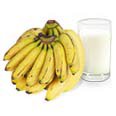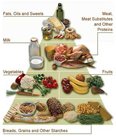|
Fresh Versus Frozen or Canned?"How to Choose Your Fruit and Vegetables"By Mirella Levin
This article addresses the question of the nutritional value of fresh versus frozen or canned fruits and vegetables and also examines whether it is healthier to eat whole fruits and vegetables or drink the juice. Making the Right Nutrional Choices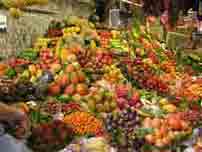
Although a pineapple will always be a pineapple, can its packaging affect its nutritional values? This applies to all fresh produce. Should we choose fresh or frozen to get the maximum value from what we eat? And what are the best choices when comparing fresh fruits and vegetables to their juices. Which has the best nutritional value? Fresh Fruits and Vegetables Fruits are well known for having high quantities of Vitamin C, which prevent us from becoming ill. Below is an example of the nutritional values of fresh fruits and vegetables:
1.http://www.cfaitc.org/LessonPlans/pdf/FruitsVegetablesHealth/409NutValue.pdf Fresh produce is known for having the highest nutritional values with the largest quantities of minerals and vitamins. They are also known for tasting better. If possible, it is recommended to buy fresh produce, but if this is not an option, one can turn to either canned or frozen foods.
Canned Fruits and Vegetables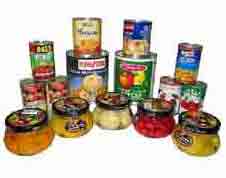
So Fresh versus Frozen?? Contrary to popular belief, a fruit does not lose a high quantity of its nutritional value when it is packaged in a can. Even though many would prefer to eat fresh produce, canned fruits are available year round and they also last much longer. However, canned foods are known for having higher levels of sodium. It is possible to buy sodium-free or low-sodium canned products too. It is also important to avoid products that have added supplements such as syrup or sugar (especially in the case of fruits). In the case of both canned and frozen substances, the amount of nutrients lost depends on the period of time between the harvesting and the canning or freezing process. The longer the time, the more nutrients lost. Therefore, when asking the question "fresh versus frozen?", it would be helpful to know if the canning or freezing is done where the produce is grown or whether the produce has been shipped a considerable distance before being processed. Frozen Fruits and Vegetables
Frozen foods are also similar in nutritional value to fresh produce. They can sometimes be advantageous because fresh fruits and vegetables can lose their nutritional value during shipping, packaging etc; whereas, a frozen item’s nutrients are locked in with the product inside. It is generally advised that if you cannot access fresh foods to purchase frozen instead of canned. When fruits and vegetables are frozen, most of the nutrients remain. However, nutritional value of these products is known to decrease due to the canning process, therefore making the frozen products the healthier option. So fresh versus frozen? The answer seems to be frozen if food is coming from a distance and perhaps also if we do not each them rapidly after buying.
Fruit/Vegetable and their juices
It is important to realize that some juices are made from 100% juice whilst others are made from fruit but may also contain sugar etc and usually have little nutritional value. It is, without a doubt, better for one to consume juice without added sugar (this will also have nutritional values closer to that of fresh fruit or vegetables). Organic fruit juice is made from real fruit and is therefore a healthier choice. Vegetable juice is healthy but it does not fulfill one’s daily vegetable intake. Nothing can replace the real vegetable so although the juice is healthy, it lacks fiber and can contain high levels of sodium. Juice can increase one’s daily intake of fruit and vegetables (the minerals and vitamins found in them) but it is not a full replacement for the actual fruit or legume.
ConclusionSo fresh vs frozen or canned? Not a significant amount of nutrients are lost when converting fresh foods into canned or frozen ones. Therefore it is not crucial that one eat only fresh produce and avoid all others. However, it is still recommended that we eat as much fresh food as possible not only because it’s slightly better for us, but it tastes better too.
TOP of fresh versus frozen fruit and vegetables
|
Subscribe to Age-well.org Ezine
Eat Well
Table of Contents
Eat-Well-Homepage
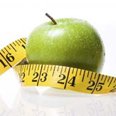
- Water
- Antioxidants
- Chocolate
- Caffeine
- Cherries
- Cranberries
- Maquiberries
- Salt
- Sugar
- Cholesterol and its Effect on Health
- Fruit & Vegetables - Fresh Versus Frozen or Canned
- Nuts, Beans and Pulses
- Monosodium Glutamate (MSG)
- Unsaturated Fats - The Right Fats for Health
- What are Transfats?
- Water
- 20 Benefits of Drinking Enough Water



All About Vitamins and Minerals

